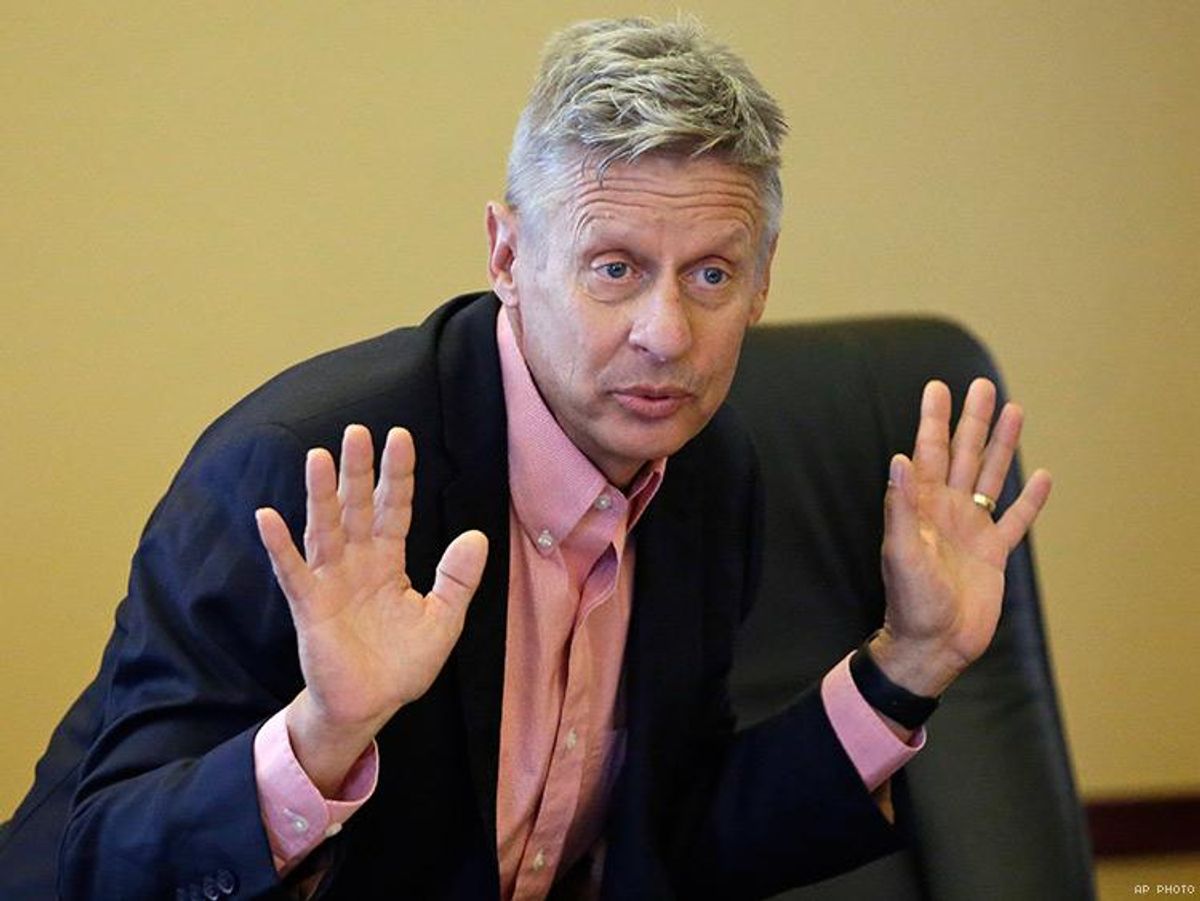Stigma
Op-Ed: The HIV-Positive Community Should Fear Gary Johnson

The Libertarian candidate may seem like a viable option for President, but he’d be even worse than Trump for those who are poz. Here’s why.
October 12 2016 3:00 AM EST
By continuing to use our site, you agree to our Privacy Policy and Terms of Use.

The Libertarian candidate may seem like a viable option for President, but he’d be even worse than Trump for those who are poz. Here’s why.
Donald Trump offers little hope to champion the concerns of the HIV-positive community. The moment he named Indiana Governor Mike Pence as his running mate, Trump dashed whatever hope remained. (Afterall, Pence's policies helped fuel his state's devestating HIV outbreak.)
But, despite what you’ve heard, of all the people running for president, Trump may not be the most dangerous for HIV-positive citizens. Instead, that title could go to former New Mexico Governor and Libertarian candidate Gary Johnson. In many ways, a Johnson presidency would be far worse for HIV treatment, care, and research than a Trump one.
The most significant and obvious impact of a Johnson presidency would be the repeal of the Affordable Healthcare Act, or ObamaCare. Prior to ACA, few insurers would take on HIV-positive patients. If Johnson were able to win the presidency, people with HIV would no longer be able to secure health care, or would need to pay an exuberant cost for that care.
Making matters worse, Johnson has pledged to cut Medicare and Medicaid by 43 percent in order to balance the budget. The U.S. Government currently budgets $34 billion for HIV research, care, and prevention. About 48 percent of this is discretionary. About $19.7 billion of the budget comes through Medicare, Medicaid, and Social Security. Proportionally, Johnson’s proposed cuts would reduce the amount of money the government would fund to about $9.85 billion. There is, however, no assurance that any portion of that remaining revenue would be directed toward HIV research, care, or prevention. Johnson could distribute the money through block grants to states, many of which have don’t have the political will to fund HIV-related programs.
The few people who could still afford HIV drugs could be economically devastated by Johnson’s tax policy. Johnson is for what he calls a “fair tax,” which taxes consumption instead of income. It is like a sales tax, with one notable exception. Most state sales taxes are applied to the retail price. Johnson’s tax would be included in the total price; effectively, the sale price plus the tax price. This increases the tax to around 39 percent. A recent estimate on the cost of HIV drug treatment placed it between $14,000 and $21,000 a year. The fair tax would increase the effective costs to $19,460 to $29,190 a year.
Two of Johnson’s core issues, school vouchers and private prisons, share the same intellectual disingenuity. Both involve the government funding private industry to do a public service. The underlying libertarian assumption is that private industry is essentially more efficient than government. But in practice, we’ve seen private schools and prisons become myopic, chase profits over results, and select the populations they wish to serve. Meanwhile public institutions have to be accountable, consider outcomes, and serve the entire community.
The best way to address the HIV epidemic is through prevention. One of the best ways to prevent people from getting HIV is through education. Unfortunately, a surprising number of American schools still teach abstinence-only sex education. Studies in the U.S. and Brittan have shown that abstinence-only sex education has virtually no effect on the frequency of teenagers engaging in sexual activity. Condoms, however, are extremely effective in preventing the transmission of HIV, something that all public schools can be required to teach. But private schools — be they religious-based or not — are beholden not to public health concerns but to conservative religious codes or parental preferences. Public schools can be answerable for the greater public good, while private can be as indifferent as theiy want.
The ability to cherry pick the population they serve also distinguishes private and public sectors. Most private prisons negotiate the populations they control. Take the contract between the State of California and Corrections Corporation of America, which excludes CCA from having to cover any of the cost of HIV medications or treatment for AIDS-related illnesses. Theoretically, CCA prison operators have no incentive to curtail HIV transmission within their prisons. On a practical matter, there is a fundamental difference between how inmates are viewed in a private and public prison. In private prison, they are effectively assets: the more prisoners, the more profits. In a public prison, prisoners are viewed as liabilities: the more prisoners, the higher the costs. This distinction is very important, because many studies have shown a linkage between incarceration and HIV rates. (Editor's Note: See our special report on HIV in prisons here).
All of these are practical ramifications of the impact a Johnson presidency would have on the HIV-positive community. The philosophical underpinnings of the Libertarian movement should be abhorrent to the HIV-positive community. It guises narcissism as personal responsibility. It suggests that the entire cost of living with HIV should only be assumed by the person who has become HIV-positive. There is a strong element of homophobia, racism, and classism in this. It harks back to a time when people thought HIV was transmitted only via drug use or anal sex — and therefore those with the disease "deserved" it. It was no accident that the HIV epidemic was ignored for almost a decade until Ryan White — a straight, white, suburban boy, became HIV-positive after a blood transfusion.
Libertarianism is a purely esoteric government argument — one that is far more suited to Sociology 101 papers than responsible government.